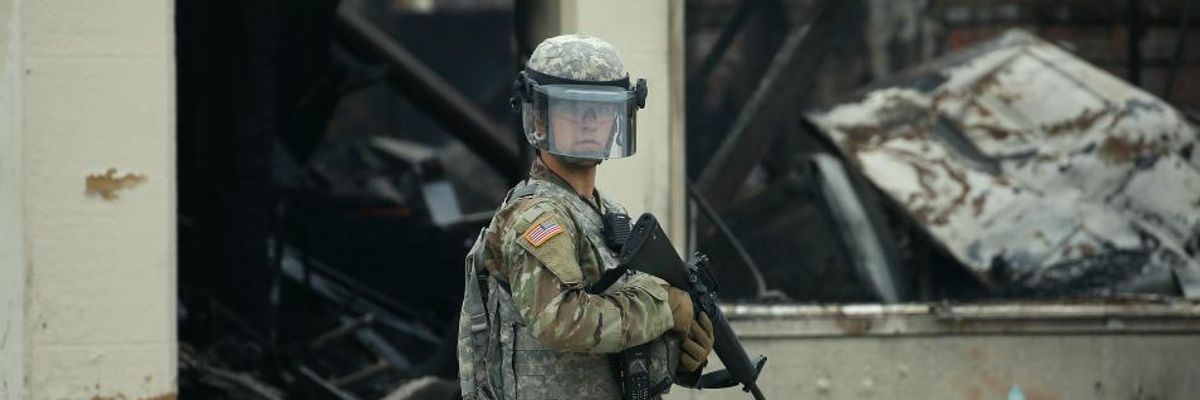As members of Congress and advocacy groups on Friday condemned President Donald Trump's "when the looting starts, the shooting starts" threat against Minneapolis protesters as morally repugnant, legal experts also warned that law enforcement officials or military personnel carrying out such an order from the president would be in violation of the Fourth Amendment of the U.S. Constitution.
"Trump doesn't care at all about the Constitution, of course, especially when he's trying to scare voters," tweeted Orin Kerr, a law professor at the University of California, Berkeley. "But actually following a policy of 'when the looting starts, the shooting starts' would violate the Fourth Amendment, for starters."
Kerr pointed to Tennessee v. Garner, a 1985 case in which the Supreme Court ruled that the use of deadly force by law enforcement "to prevent the escape of all felony suspects, whatever the circumstances, is constitutionally unreasonable."
"Where the suspect poses no immediate threat to the officer and no threat to others, the harm resulting from failing to apprehend him does not justify the use of deadly force to do so," the high court's ruling states.
In a tweet early Friday morning as nationwide protests against the police killing of George Floyd intensified for the fourth straight day, Trump called Minneapolis demonstrators "thugs" and said he is prepared to send in the U.S. military to occupy the city with a green light to open fire on those who damage property and steal goods.
"Any difficulty and we will assume control but, when the looting starts, the shooting starts," Trump tweeted. "Thank you!"
Twitter posted a content warning over the tweet and said the president's message violated the platform's rules against "glorifying violence."
As HuffPost's Sara Boboltz pointed out, Trump "did not coin the phrase 'when the looting starts, the shooting starts.' The line is half a century old, and combative Miami Police Chief Walter Headley Jr. originally used it during the height of civil rights protests in the 1960s."
"Headley led the Florida city's law enforcement from 1948 until his sudden death in 1968," Boboltz noted. "He attracted national attention and condemnation in December 1967, when he threatened to step up already severe policing practices that included use of tear gas and an aggressive stop-and-frisk policy."
George Wallace, the racist former governor of Alabama, also used the phrase during his 1968 presidential bid.
Former U.S. Attorney Barbara McQuade, an NBC News legal analyst, said "Trump's tweet threatening 'shooting' in Minneapolis is disgusting and repulsive to our system of laws."
"Every American should denounce this threat to use unconstitutional deadly force," McQuade tweeted.
Sen. Elizabeth Warren (D-Mass.) condemned the president's threat as a call "for violence against Black Americans."
"His advocacy of illegal, state-sponsored killing is horrific," tweeted Warren. "Politicians who refuse to condemn it share responsibility for the consequences."
In a statement on Friday, Jeffery Robinson, director of the ACLU's Trone Center for Justice and Equality, urged the hundreds of National Guard members who have been activated in Minneapolis as well as the city's police force to "comply with the law and not President Trump."
"President Trump has told police officers in New York that they should feel free to use violence against 'thugs being thrown into the back of a paddy wagon,'" Robinson said. "He did not hesitate to claim to a foreign leader that there is no racial problem in America. The president's latest suggestion that law enforcement or the military should literally murder protesters is, unfortunately, no longer shocking."
"Trump's response ignores the fact that the inherent problem is not the reaction to Mr. Floyd's murder," Robinson added. "The problem is Mr. Floyd's murder."

